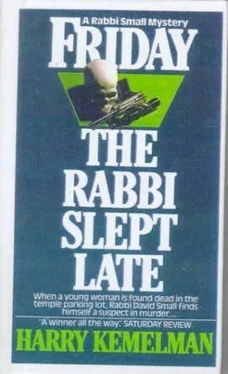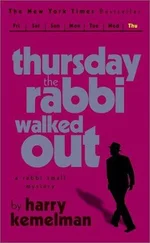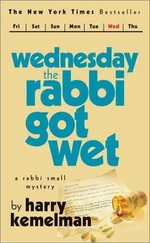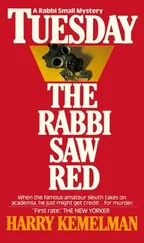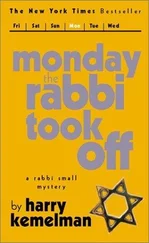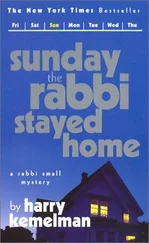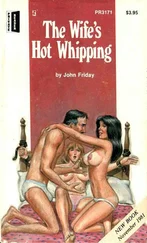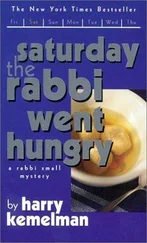Harry Kemelman - Friday The Rabbi Slept Late
Здесь есть возможность читать онлайн «Harry Kemelman - Friday The Rabbi Slept Late» весь текст электронной книги совершенно бесплатно (целиком полную версию без сокращений). В некоторых случаях можно слушать аудио, скачать через торрент в формате fb2 и присутствует краткое содержание. Жанр: Детектив, на английском языке. Описание произведения, (предисловие) а так же отзывы посетителей доступны на портале библиотеки ЛибКат.
- Название:Friday The Rabbi Slept Late
- Автор:
- Жанр:
- Год:неизвестен
- ISBN:нет данных
- Рейтинг книги:5 / 5. Голосов: 1
-
Избранное:Добавить в избранное
- Отзывы:
-
Ваша оценка:
- 100
- 1
- 2
- 3
- 4
- 5
Friday The Rabbi Slept Late: краткое содержание, описание и аннотация
Предлагаем к чтению аннотацию, описание, краткое содержание или предисловие (зависит от того, что написал сам автор книги «Friday The Rabbi Slept Late»). Если вы не нашли необходимую информацию о книге — напишите в комментариях, мы постараемся отыскать её.
Friday The Rabbi Slept Late — читать онлайн бесплатно полную книгу (весь текст) целиком
Ниже представлен текст книги, разбитый по страницам. Система сохранения места последней прочитанной страницы, позволяет с удобством читать онлайн бесплатно книгу «Friday The Rabbi Slept Late», без необходимости каждый раз заново искать на чём Вы остановились. Поставьте закладку, и сможете в любой момент перейти на страницу, на которой закончили чтение.
Интервал:
Закладка:
"But they're the ones that pay the piper, so I suppose that gives them the right to call the tune," the rabbi remarked.
"The temple and the community are bigger than a few large contributors," said Wasserman. "A temple-"
He was interrupted by the doorbell, and the rabbi went to answer it. It was Stanley.
"You been waiting so anxious for those books, rabbi," he said, "that I thought I'd stop on my way home to tell you they came. It was a big wooden box, so I brought it up to your study and pried the lid off for you."
The rabbi thanked him and returned to the living room. But he could barely conceal his excitement. "My books have come, Miriam."
"I'm so glad, David."
"You won't mind if I go over to look through them?" Then he suddenly remembered his guest. "They're some rare books that were sent to me from the Dropsie College Library for a study I'm doing on Maimonides," he explained.
"I was just going, rabbi," said Wasserman, rising from his chair.
"Oh, you can't go now, Mr. Wasserman. You haven't finished your tea. You'll embarrass me if you leave now. Insist that he remain, Miriam."
Wasserman smiled good-naturedly. "I can see, rabbi, that you're anxious to get to your books and I don't want to keep you. Why don't you go on and I'll keep Mrs. Small company for a while."
"You're quite sure you don't mind?" But already he was heading for the garage.
His way was blocked by his wife, her firm little chin held high. "You will not leave this house, David Small," she announced, "unless you put on your topcoat."
"But it's mild out," he protested.
"By the time you get home, it will be quite chilly."
Resigned, the rabbi reached into the closet for his coat, but instead of putting it on he draped it defiantly over his arm.
Mrs. Small came back to the living room. "He's like a boy," she said by way of apology.
"No," said Mr. Wasserman. "I think maybe he wanted to be by himself for a while."
The Surfside was considered a reasonable restaurant: the prices were moderate, the service, though not fancy, was brisk and efficient, and although the decor was plain the food was good and the seafood exceptional. Mel Bronstein had never eaten there but as he approached, a car parked in front of the door pulled away and he took this as a sign. He remembered having heard the place well spoken of, and tooled his big blue Lincoln into the spot just vacated.
There were not too many people in the restaurant, he saw, as he made his way to a booth and ordered a martini. The walls were hung with lengths of fishnet, and other articles suggestive of the sea: a pair of oars, a mahogany ship's wheel, painted wooden lobster-trap floats, and occupying a wall to itself, a truly imposing swordfish mounted on a mahogany panel.
He glanced around and, not surprisingly, saw no one he knew. The Surfside was in the lower part of town, Old Town, and people from his section, Chilton, rarely went there.
Most of the booths were occupied by couples, but diagonally across from him a young girl was, like himself, sitting alone. She was not pretty, but she had a young, fresh look. By the way she kept looking at her wristwatch he assumed she was waiting for someone; she had not ordered, but every now and then she sipped at her water glass, not because she was thirsty but because everyone else was eating.
The waitress came over to ask if he were ready to order, but he motioned to his glass to indicate a refill.
The girl opposite now seemed increasingly disturbed over the failure of her escort to appear. Each time she heard the door open, she turned around on her bench. Then, quite suddenly, her mood changed. She straightened up as if she had come to a decision. She drew off her white gloves and stuffed them into her handbag as though making ready to order. He saw she was wearing a wedding ring. As he watched, she twisted her ring off, opened her bag, and dropped it into the change purse.
She looked up and saw him watching her. Blushing, she turned away. He glanced at his watch. It was quarter to eight.
Hesitating only a moment, he eased out of the booth and went over to her. She looked up, startled.
"I am Melvin Bronstein," he said, "and quite respectable. I hate to eat alone and I imagine you do. Wouldn't you care to join me?"
Her eyes widened like a child's. For a moment she lowered them, and then she looked up at him again and nodded.
"Let me give you some more tea, Mr. Wasserman." He inclined his head in thanks. "I can't tell you how badly I feel about this business, Mrs. Small. After all, I picked your husband; he was my personal choice."
"Yes, I know, Mr. Wasserman. We wondered about it at the time, David and I. Usually when a congregation wants to hire a rabbi they ask a number of candidates to come down on successive Sabbaths to conduct the services and to meet with the board of directors or with the ritual committee. But you came down to the seminary alone, and on your own responsibility you picked David." She eyed him speculatively and then immediately dropped her eyes to her teacup. "Perhaps if the ritual committee had acted as a whole they would have felt friendlier to him," she said quietly.
"You think perhaps I insisted on making the selection myself? Believe me, Mrs. Small, the responsibility was not of my choosing. I would have preferred to let the decision rest with the ritual committee or with the board, but the building was finished in early summer, and the board was determined to start the New Year in September completely organized. When I suggested that the ritual committee go down to New York in a body-there are only three of us: Mr. Becker, Mr. Reich, and myself-it was Mr. Becker, if you please, who insisted that I go alone. 'What do Reich and I know about rabbis, Jacob?' Those were his exact words. 'You know, so you go down and pick him. Anyone you choose will be all right with us.' Maybe he was busy and couldn't go out of town at the time, or maybe he really meant it. At first, I didn't want to take the whole responsibility. Then, when I thought it over, I decided maybe it would be for the best. After all, Reich and Becker, they really do know nothing. Becker can't even say his prayers in Hebrew, and Reich isn't much better. I had already had one lesson. When it came to awarding the contract for the construction of the temple they hired Christian Sorenson as the architect. A Jewish architect wouldn't do. If I hadn't spoken out, the name Christian Sorenson- Christian, mind you-would have been on a bronze plate on the front of the temple.
The renowned ecclesiastical architect, Christian Sorenson, an exquisite with a black silk artist's bow tie and pince-nez on a black ribbon to gesture with, had prepared a pasteboard model showing a tall, narrow box of a building with long narrow windows alternating with decorative columns of stainless steel. "I have spent the last fortnight in familiarizing myself with the basic tenets of your religion, gentlemen, and my design is intended to express its essential nature." (A goon, Wasserman had thought, who can understand the essential nature of Judaism in two weeks!) "You will note that the tall narrow lines give a sense of aspiration, calling as they do for an upward movement of the eyes; that the simplicity of the design, stark and unrelieved by any trumpery decoration" - (Was he referring to the traditional Jewish symbols: Star of David, seven-branched candelabrum, Tables of the Law?)-"typifies the practical simplicity, if I may say so, gentlemen, the basic common sense of your religion. The stainless steel columns suggest both the purity of the religion and its resistance to the decay and erosion of time."
The front elevation showed a row of stainless-steel doors from either side of which extended a long wall of glazed white brick that started at the full height of the doors and sloped away in a gentle curve to the extremities of the plot, "serving not only to soften the lines of the central mass, but also to relate it to the terrain. You will note that the effect is like a pair of open, embracing arms, calling upon people to come and worship. As a practical matter, these two walls, one on either side of the entrance, will separate the parking lot in front from the lawn which encircles the rest of the building."
Читать дальшеИнтервал:
Закладка:
Похожие книги на «Friday The Rabbi Slept Late»
Представляем Вашему вниманию похожие книги на «Friday The Rabbi Slept Late» списком для выбора. Мы отобрали схожую по названию и смыслу литературу в надежде предоставить читателям больше вариантов отыскать новые, интересные, ещё непрочитанные произведения.
Обсуждение, отзывы о книге «Friday The Rabbi Slept Late» и просто собственные мнения читателей. Оставьте ваши комментарии, напишите, что Вы думаете о произведении, его смысле или главных героях. Укажите что конкретно понравилось, а что нет, и почему Вы так считаете.
